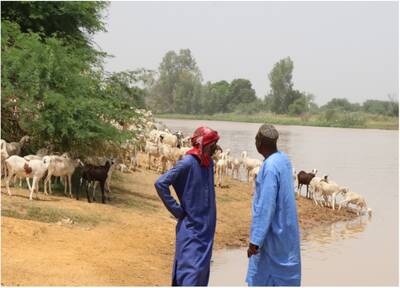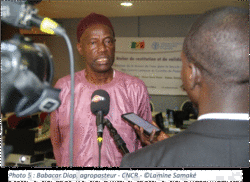Stories from the field: poems and a project for peace
Although the Senegal River Basin is home to many farmers and plays a key role in the country's food security, farmers face difficulties in accessing and managing water resources. FAO’s Knowing Water Better - towards fairer and more sustainable access to natural resources (KnoWat) project conducted a water tenure assessment in the basin to improve the equitable allocation of water resources.
In northern Senegal there is a fishing village called Ngaolé next to the Senegal River. The river partly marks the border between Senegal and Mauritania and is only a short distance from the Sahara – the world's largest hot desert. Wooden canoes used by fishermen can often be seen on the red banks of the river, which is famously occupied by crocodiles. But the fishermen are not afraid. During local ceremonies, ‘pekaans’ or long poems are sung to the water spirits to protect the fishermen and the community from harm.
This protection is needed now more than ever as communities face new challenges from climate change, prolonged droughts and population growth. The overexploitation of groundwater and pollution have led to water scarcity. This has greatly aggravated the already difficult lives of many people in the rural north. Poverty and food insecurity are prevalent in the area, where most people engage in fishing, livestock rearing or subsistence farming.
Combined with a lack of clarity over water access and management rights, the scarcity of water resources often leads to conflict between herders and farmers. Moving from one place to another, pastoralists need water for their livestock, but farmers are not always willing to share their limited water resources.
Ousmane Ly, 59, is a pastoralist who lives in Guia, close to Ngaolé. According to Ly, because of climate change, the livestock in the area has been considerably reduced as the grazing space has shrunk. Due to the scarcity of fodder and water points, early and prolonged transhumance is the only alternative for local pastoralists. This can cause tension – and even conflict – between farmers and herders. According to Ly, "The reduction of grazing areas and the distance to water points are due, on the one hand, to the galloping demography with the consequences of the extension of villages and small towns (Taredji, Ndioum) on the cattle routes for access to water or grazing areas; on the other hand, to the hydroagricultural developments (Ngallenka, Nianga casier, etc.).”
The FAO KnoWAT project has provided a concrete solution to this problem through the evaluation of water tenure. This assessment should be extended to all of Senegal and the countries of the Senegal River Basin to promote social cohesion and peace between different water users.
FAO's work on equitable water access and use
The KnoWat project carried out a water tenure assessment in two areas of the Senegal River Basin, Podor (adjacent to Ngaolé village) and the Gorom-Lampsar axis in Saint-Louis, to support the equitable allocation of water to users in these areas. In addition, a WaPOR (WAter Productivity through Open-access of Remotely-sensed derived data) database on water consumption and productivity was developed and the project team conducted capacity building activities on water resources assessment for technical staff in the country from 2019 to 2022.
Formal laws give people legal rights to use and access water, but these rights are often also determined by local habits and customs. The problem is that these customs do not guarantee people's right to use and access water. According to Sofia Espinosa, a land and water specialist at FAO and one of the supervisors of the water tenure assessment in Senegal:
"During the assessment, we discovered that some rivers in the Senegal River Basin are considered sacred by the local population and have not been touched for generations. But there is no document that gives them this right. Imagine if these rivers were suddenly used, for example for irrigation, by someone who had acquired a legal right to them? That would be terrible for the local people. That's why we need to study these different tenures, in order to protect local people's access to and use of water."
Since water tenure assessment is a new concept, the KnoWat project developed a methodology for the process. The methodology is a balanced approach that employs desk research, fieldwork for data collection, training and participatory consultations with policymakers, national stakeholders and local people that depend on water for their livelihoods. It examines official laws and policies, their implementation and enforcement.
In Senegal, the assessment found that there are many other types of water tenure that are legitimate based on custom or religious belief but do not fall within the country's legal framework.
"Besides this example of customary use of water resources, people have a practice of fishing in the Senegal River, but the legal framework does not recognize this type of custom, and the fishermen are not yet aware of it. Similarly, some farmers in the region are involved in flood recession farming, but if there are dams in certain areas, this type of farming will be threatened and reduced to a minimum," said Sofia Espinosa.
Protecting and securing local practices by including them in the legal framework, or finding an alternative solution, would bring greater security to people by protecting their livelihoods and customs.
"The advantage of [the KnoWat] project is that we have interrogated the traditional and legal arrangements of water governance and we have many … difficulties related to water management in the Senegal River Basin. A deep understanding of these difficulties has therefore been [made] possible thanks to the water tenure assessment study and our aim now is to ensure that this approach and the results obtained are disseminated and known to the public, in particular to decision-makers at national and local levels," said Babacar Diop, an agropastoralist in Ross Bethio and administrator of the Conseil National de Concertation des Ruraux (CNCR).
Perfect timing
Senegal is currently involved in the process of revising its water law. The water tenure assessment, and its recommendations, are expected to contribute to this process.
"We held a validation workshop at both local and national levels with stakeholders, some of whom are also already involved in the revision of the water code. At the end of these workshops, the evaluation report was validated in May 2022 in Dakar by all the actors involved, which is promising," explained Lamine Samaké, KnoWat’s National Coordinator.
Younoussa Mballo, Technical Advisor to the Senegalese Ministry of Agriculture, Rural Equipment and Food Sovereignty, considers the project's work to have been useful:
"We believe that the KnoWat project has helped to refine our water governance policies, programmes and strategies and directed them towards a more effective and efficient use of water resources. Senegal is endowed with a large amount of water resources and these resources will be managed even better considering the results obtained throughout the KnoWAT project. In the end, we believe that if there are still issues to be clarified in this process, we should see how to continue this work and especially how to scale it up."
While Senegal is on track to address its water challenges, the situation remains alarming at the global level.
"More than 733 million people currently live in areas of high or critical water stress, and global water demand is expected to increase by 30 percent by 2050. Agriculture is by far the biggest user, accounting for 72 percent of global water withdrawals. The question is how to solve this puzzle for sustainable development for people and the planet? We believe that responsible water governance, including work on water tenure, is an important tool to address the challenge of the decade," concluded Benjamin Kiersch, global coordinator of the KnoWat project.




